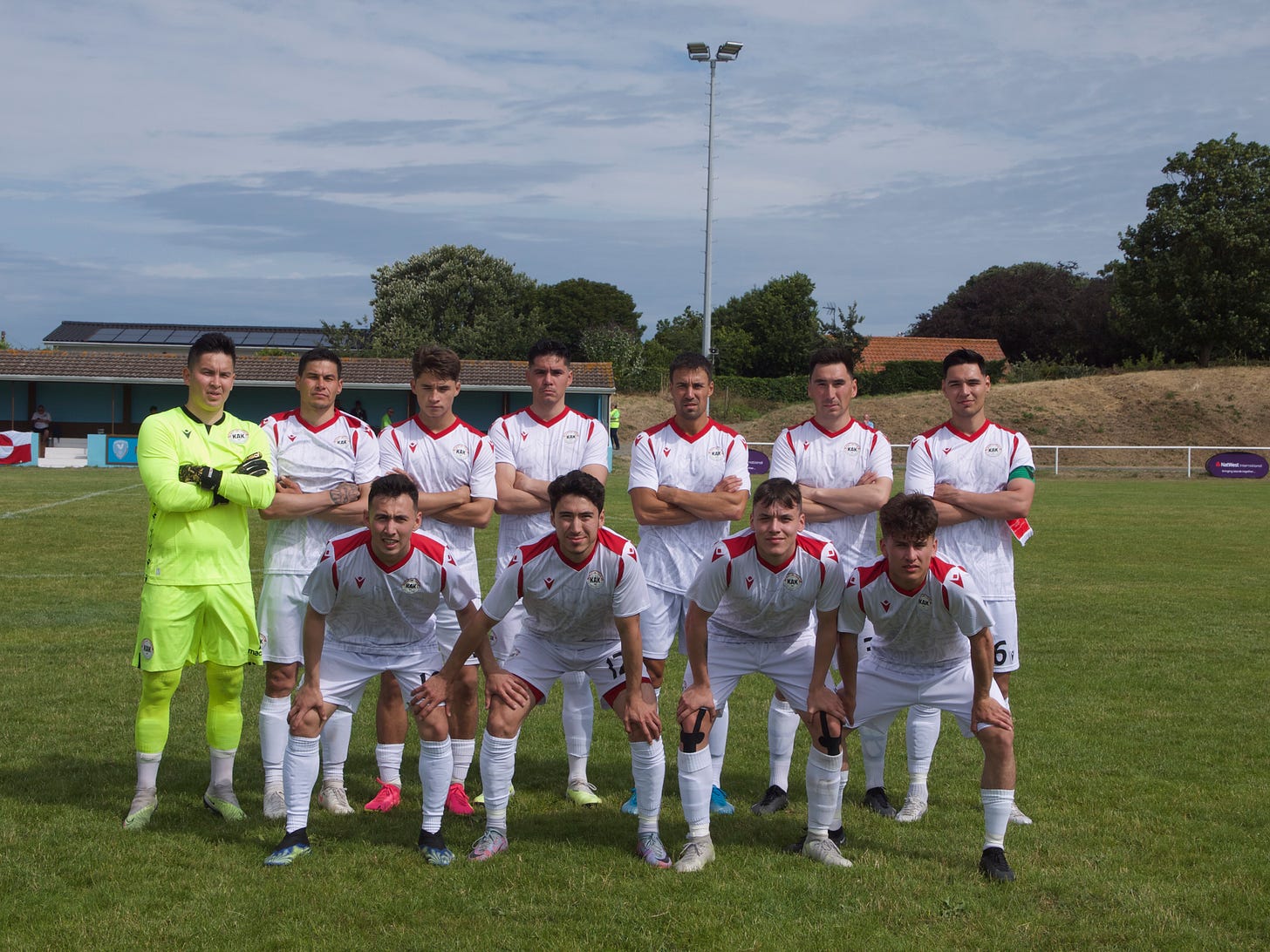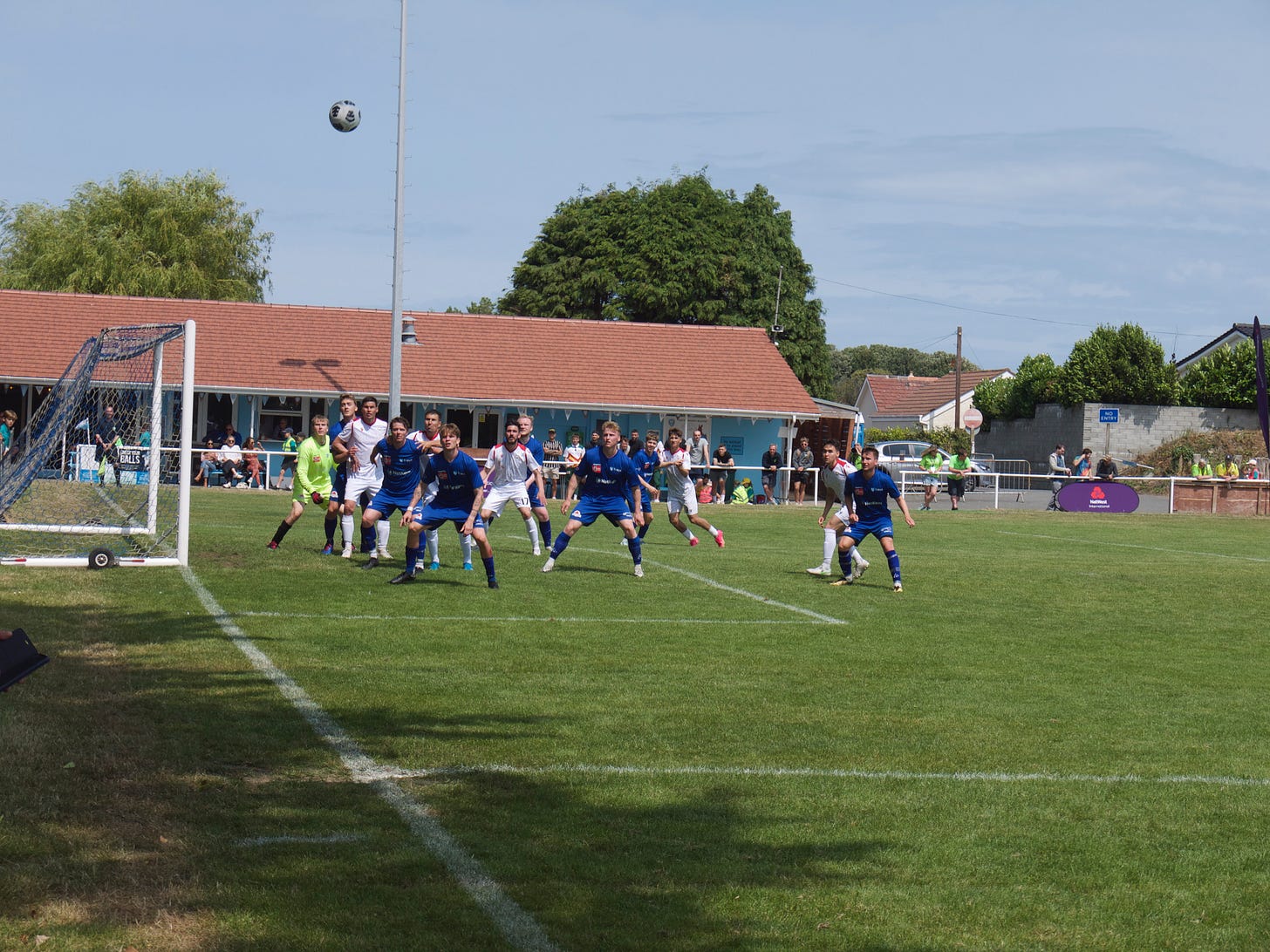The Greenland clause: how FIFA are closing the door on new members
Nations much smaller than Greenland receive millions of dollars of development cash as full members of FIFA. So why are some nations locked out of football's global party?
Coming up - Steve Menary on how FIFA have invoked the United Nations to prevent a crop of nations progressing membership claims. But first…
Following last week’s investigative series on hyper-inflation in football ticket pricing, I’ve been working on the next series, which will use a data model developed for Lloyds of London - where Sporting Intelligence salary data was the key input - to predict the outcome of Euro 24. The model correctly predicted the winner of two of the last three men’s World Cups (it had England beating Brazil in the final in Qatar).
In the meantime, here’s Steve…
By Steve Menary
The Artic island of Greenland has started out on the long road to international footballing recognition just as FIFA looks to have closed the door on new members.
Greenland is an autonomous territory of the Kingdom of Denmark, but the football federation, KAK, decided to cut traditional links with Europe and on May 13 a courier delivered a membership application to the Miami headquarters of the Confederation of North, Central America and Caribbean Association Football (CONCACAF).
KAK president Kenneth Kleist said: “With CONCACAF membership, we will have the opportunity to participate in international tournaments and exchange experiences with other nations, which will be invaluable for our sport and society.”
The only current competitive outlet for Greenland’s national team is the football tournament at the biannual Island Games. Footballing nations far smaller than Greenland (population 56,661) regularly play in major tournaments, including in qualifiers for the World Cup.
Montserrat, for example, a British Overseas Territory in the Caribbean, has a population of just 4,992, but in the first qualifying phase for the Qatar 2022 World Cup, went unbeaten in their four matches and were only pipped to the next stage by El Salvador, who won 10 points to Montserrat’s eight.
A majority of Montserrat’s players compete at amateur level, mostly in England, but recent squads have also included EFL professionals, from Reading and Walsall to Fleetwood, Barnsley and Cambridge.
As one of 211 full FIFA members, the Montserrat FA receives around $8m a year from FIFA to help run football there, and develop the game. The XLS file below lists all 211 full FIFA members as well as the nations who are members of regional confederations but not FIFA, and the six United Nations members who are neither a member of a confederation or FIFA.
It is far from outlandish that Greenland should want to join the party.
Recognition for KAK could pave the way for entry to the bottom level of the CONCACAF Nations League and produce some of football’s more arduous fixtures.
For example, as the crow flies, Guyana, on the northern tip of South America, is 6,400km from the Greenlandic capital of Nuuk, but the journey between them would be significantly longer given the multiple travel connections that such a trip would require.
Acceptance is a long way off. The CONCACAF General Secretary, Philippe Moggio, to whom KAK personally addressed the application, has still not even acknowledged receipt of the application.
The Greenlanders could end up facing insurmountable hurdles. CONCACAF tends to follow the lead of FIFA in many areas and the world body recently shut the door on a swathe of national federations that have been accepted as members by regional confederations.
Football’s world governing body has 211 members but has not welcomed any new representatives since Kosovo and Gibraltar in 2016 – both were admitted after opposition and lengthy legal tussles.
FIFA did try to facilitate Kosovo’s entry to full membership, which had been blocked at regional level by opposition from Serbia, but worked with UEFA to help keep out Gibraltar to appease Spain, which claims the British territory.
At FIFA’s recent congress in Bangkok, a whole swathe of amendments were made to the world body’s statutes and standing orders.
One little-noticed amendment proposed a change to the membership requirements, so that any potential new members must be recognised as an independent country by the United Nations.
The changes were proposed with little warning and all waved through, but KAK had been alerted by a source at the Danish union, the DBU, and the application was delivered the day that FIFA’s Congress began on May 13.
FIFA’s entry criteria had been unclear outside of a stipulation that new applicants are members of a regional confederation for two years before applying.
The changes bring the world body into line with UEFA, whose own rules had allowed in the Faroe Islands, also a self-governing part of the Kingdom of Denmark. UEFA only tightened up its rules after Gibraltar had applied and was subsequently forced to accept the British Overseas Territory in 2013 after a CAS ruling.
Spain, which claims Gibraltar, had tried to block the application and Serbia’s FA did the same, but both associations were subsequently admitted to FIFA in 2016.
FIFA has not accepted any new members since and relied on a similar argument to block applications by the Dutch Caribbean territories of Bonaire and Sint Maarten. FIFA had also insisted that new members are part of one of the six regional confederations for at least two years before applying for full membership, but its membership rules did not make UN membership a criteria until the changes in Bangkok.
Along with Bonaire and Sint Maarten, the French Caribbean territories of French Guiana, Guadeloupe, Martinique and Saint Martin were all upgraded from associate to full membership of CONCACAF in 2013 and are among the 11 associations now stuck after FIFA’s recent rules changes, although Sint Maarten did challenge FIFA’s rejection at the Court of Arbitration for Sport before the Bangkok meeting. No judgement has yet been published.
The four French territories in CONCACAF have been held back by lack of support from the French Football Federation, which is also likely why the Indian Ocean department of Reunion remains an associate member of the Confederation of African Football.
Zanzibar – politically part of Tanzania since 1964 but which has played international football within Africa for a century – was briefly made a full CAF member in 2017, then returned to associate level four months later. The change was interpreted as helping Morocco in cutting off any possible future application by the disputed region of Western Sahara, which was occupied by Spain until 1975 when Morocco took control of most of the territory.
In the Pacific, the Oceania Football Federation revoked the Niue Islands Soccer Association’s membership in March 2021 for what was described as a decade of inactivity. Islanders in Niue dispute this and the OFC’s track record of helping new members is poor.
Kiribati and Tuvalu have been stuck as associate OFC members for years for what is often cited as lack of infrastructure, which FIFA money from full membership would help resolve. The OFC’s lack of support has prompted other Pacific associations to look elsewhere for help.
Northern Mariana, a US-controlled territory, was recognised as a full member of the Asian Football Confederation in 2021 and cleared this year to play in the 2027 Asian Cup qualifiers.
“We have many programs, and we try to develop football within our very small population,” said coach Michiteru Mita after his side had taken part in the 2023 Pacific Games. Despite losing 10-0 to Fiji and 5-0 to Tahiti, Northern Mariana then scored four goals without reply against American Samoa – a full FIFA member that had fallen off the world rankings due to not playing any games for more than four years before the Pacific Games, but which still receives regular payments.
Another Pacific territory, Palau, also applied to the AFC but were knocked back in March 2023. As a member of the UN since 1994, Palau at least meets FIFA’s criteria and is one of five other countries in the same boat, but football development here is sparse. The Marshall Islands did not even have an association until 2021.
The other 11 more established associations are now stuck. According to this article published by FIFA at the end of 2023, responsibility for helping the six CONCACAF members left outside the world body lies with the Caribbean Football Union. “Many of these territories don't fulfil (sic) the requirements of becoming a member of either FIFA or the UN, for that matter,” wrote FIFA. “Blame it on its colonial past.”
Not for the first time, FIFA’s problems are laid at the door of others. The world body lays claim to the hashtag #footballunitestheworld# but in some parts of the world, this is clearly nonsense.
Steve Menary is the author of Outcasts! The Lands That FIFA Forgot, which was shortlisted for the 2008 NSC Football Book of the year Award.








